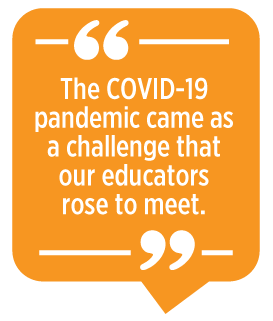|
 It's summer here in the United States and for many the
school year is over. It had been on hiatus for most of the spring as we
grappled with the COVID-19 public health and financial crisis. Although some in
our global community are returning to normal activity, others are unfortunately
confronting rising rates of infection.
It's summer here in the United States and for many the
school year is over. It had been on hiatus for most of the spring as we
grappled with the COVID-19 public health and financial crisis. Although some in
our global community are returning to normal activity, others are unfortunately
confronting rising rates of infection.
Now, in
early July, we in TESOL are poised between two major events that are direct
results of the crisis. We have just completed our first Virtual
TESOL Advocacy & Policy Summit and will soon hold our first Virtual
Convention. Both events came together in just a few months as our
staff and council members pivoted from face-to-face meetings to remote ones.
Despite the sudden transition, the Advocacy & Policy Summit was a
terrific success with close to three times as many registrants than ever before
(309 people!), and the Convention is shaping up to be a triumph as
well.
 The past few
months have offered us opportunities to be strong advocates for our students,
colleagues, and families. The COVID-19 pandemic came as a challenge that our
educators rose to meet. Schools were shut and teachers had to provide remote
learning in any way possible. Some educators made the transition fairly
smoothly—they were familiar with distance-learning technology and their students
were also. But many others had a steep learning curve to climb. Some worked in
school districts and colleges that did not consider the socioemotional needs of
English learners and made no provision for continuing the teaching of English.
Some had learners who lacked devices to support remote teaching and learning,
and/or limitations regarding Internet access, bandwidth, and learning
platforms. Many were unable to assess their students to measure progress or
determine placement. But through incredible amounts of time and effort,
combined with creativity and advocacy for the needs of our learners, our TESOL
members persevered. The myTESOL
COVID-19 space and resources, along with the webinars and other
supports our interest sections, professional learning networks, councils, and
affiliates provided, helped turn what could have been 3 months of lost
instruction into a time of collaboration, compassion, engagement, and
ultimately, language learning. The past few
months have offered us opportunities to be strong advocates for our students,
colleagues, and families. The COVID-19 pandemic came as a challenge that our
educators rose to meet. Schools were shut and teachers had to provide remote
learning in any way possible. Some educators made the transition fairly
smoothly—they were familiar with distance-learning technology and their students
were also. But many others had a steep learning curve to climb. Some worked in
school districts and colleges that did not consider the socioemotional needs of
English learners and made no provision for continuing the teaching of English.
Some had learners who lacked devices to support remote teaching and learning,
and/or limitations regarding Internet access, bandwidth, and learning
platforms. Many were unable to assess their students to measure progress or
determine placement. But through incredible amounts of time and effort,
combined with creativity and advocacy for the needs of our learners, our TESOL
members persevered. The myTESOL
COVID-19 space and resources, along with the webinars and other
supports our interest sections, professional learning networks, councils, and
affiliates provided, helped turn what could have been 3 months of lost
instruction into a time of collaboration, compassion, engagement, and
ultimately, language learning.
The second
opportunity came with the resurgence of the Black Lives Matter movement. As we
watched in horror at the police brutality that took the lives of Breonna
Taylor, George Floyd, and Rayshard Brooks, to name but a few of the more recent
victims, we realized we needed to make it clear that TESOL is an antiracist
association. Our Statement
on Racial Injustice and Inequality was written to express solidarity
with our Black colleagues and students and others in communities of color. It
reaffirmed TESOL’s commitment to diversity, equity, and inclusion. Social
justice has walked hand-in-hand with English language teaching for many years,
and we must continue to advocate for justice and the end of systemic racism,
discrimination, and bias.
We also need
to listen, reflect, and learn, and TESOL will continue to promote further conversation,
education, and professional development. We have published online a freely
available special issue of curated articles from TESOL
Quarterly and TESOL Journal entitled “Race,
Identity and English Language Teaching” and have collected resources
including readings for self-education and classroom materials to support
antiracist education (coming soon).
Nelson
Mandela said, “Without language, one cannot talk to people and understand them;
one cannot share their hopes and aspirations, grasp their history, appreciate
their poetry, or savour their songs.” We are language educators with knowledge
and expertise that can advance high quality English language teaching. Let us
live and work in a manner that exemplifies our core values, including our
commitment to equity, diversity, multilingualism, multiculturalism, and
individuals’ language rights. Let us continue to advocate for our students,
their families, our colleagues, and our friends and help provide them with safe
and welcoming environments in which to teach and learn.
I
hope to see you at our Virtual
Convention 16–18 July 2020.
Deborah J. Short, PhD, is TESOL International Association president (2020–2021). She directs Academic Language Research & Training, LLC and provides professional development on academic literacy, content-based ESL, and sheltered instruction worldwide. She has led numerous research projects related to English learner education, codeveloped the SIOP Model, and served as series editor for several 6 Principles books. |